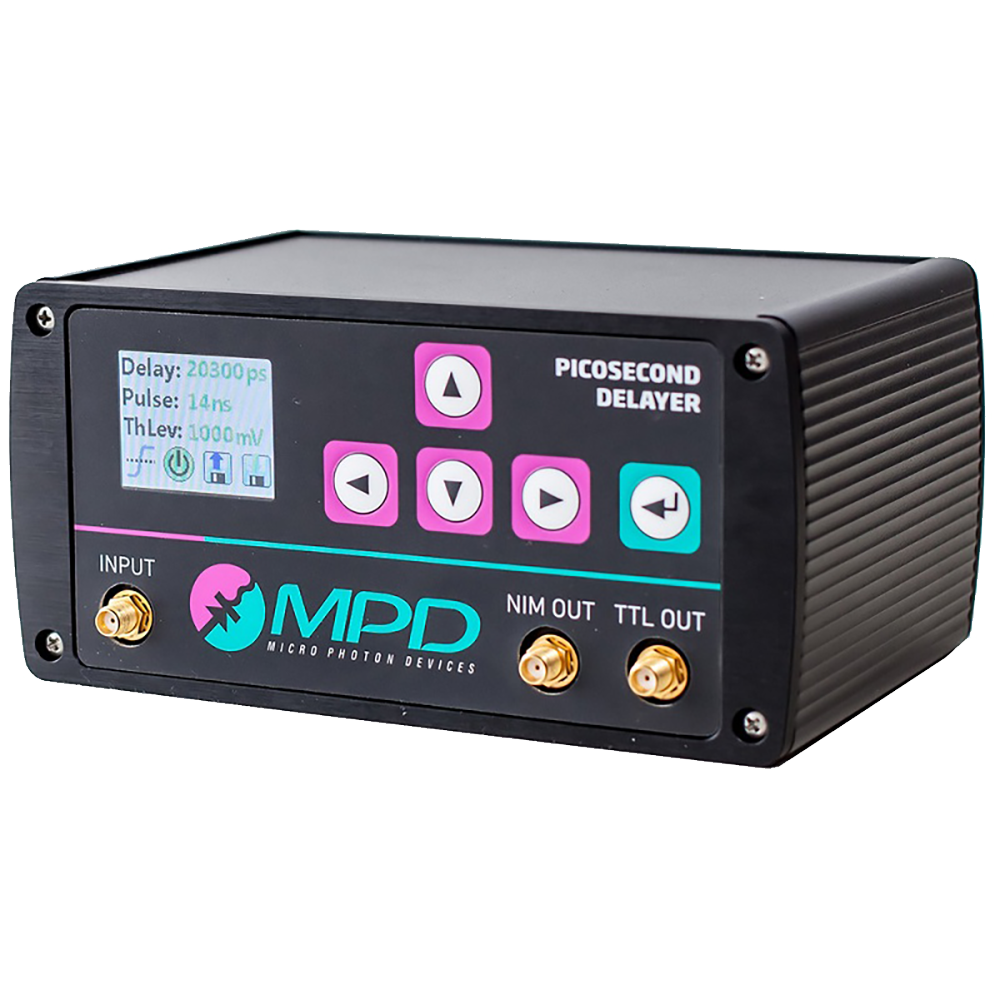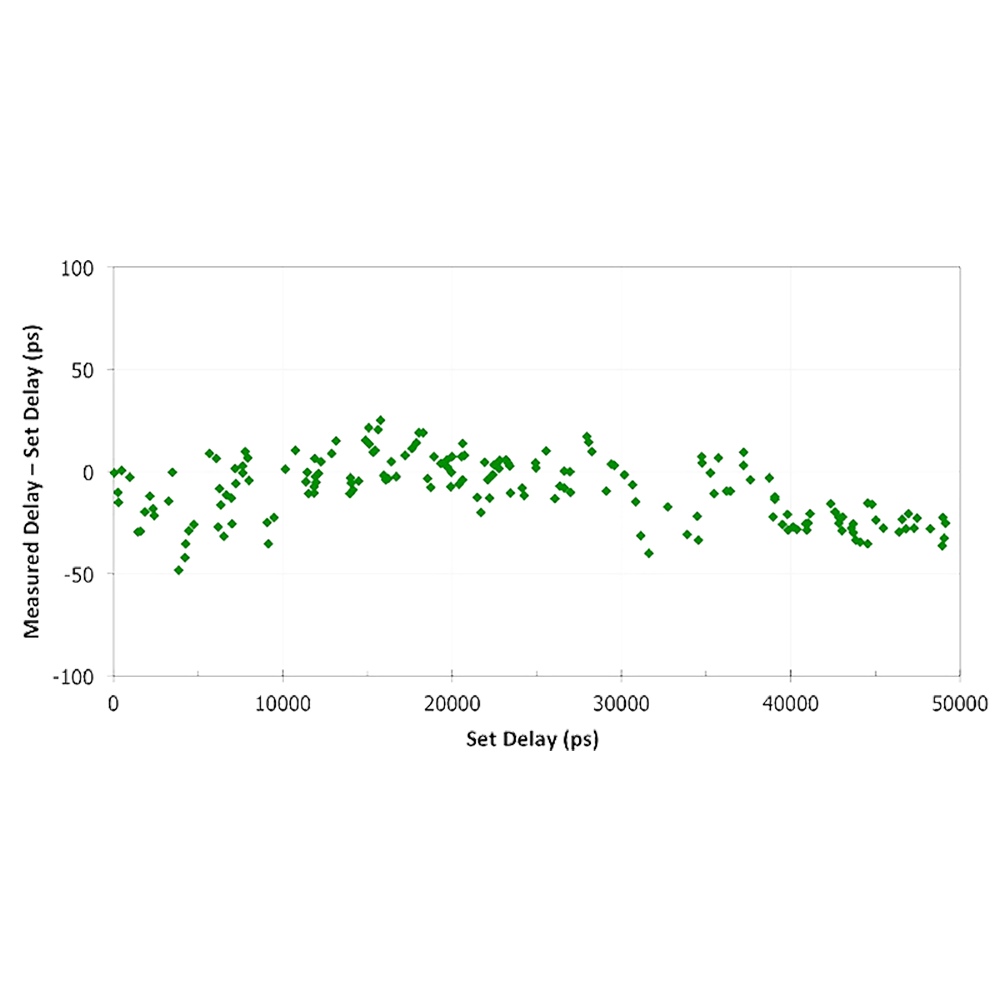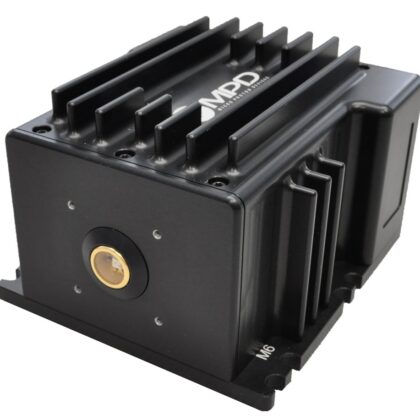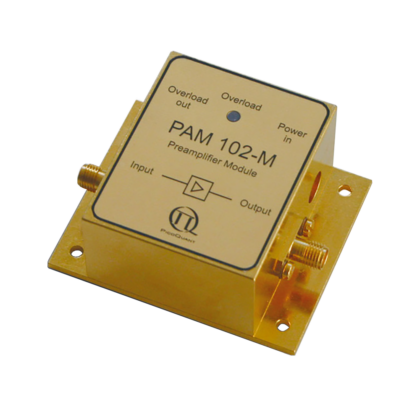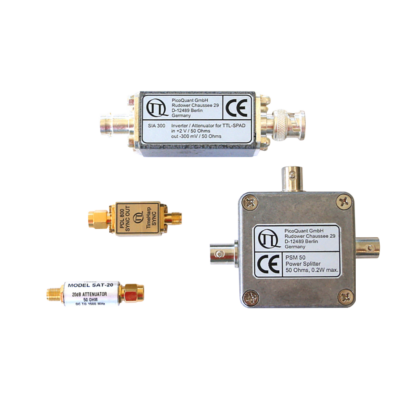Picosecond Delayer
- 50 ns maximum delay range, 10 ps step
- TTL and NIM output pulses
- Up to 390 MHz bandwidth (NIM output)
- Programmable output width
- INL between +50 ps and -100 ps over full-scale range and for all temperatures
- Random jitter typ. 5 ps RMS
- < 1 ms programming time
- USB interface
- All solid state, no coax cables
The picosecond delayer is a module designed and manufactured by Micro Photon Devices (MPD) that is capable of generating output pulses (both NIM and TTL) with user-selectable delay and output pulse duration, in respect to the rising or falling edge of an input signal.
The delayer is completely based on solid-state components and features a 50 ns nominal full scale range with a 10 ps step delay resolution, whilst the pulse duration is also user controllable from 1 ns to 250 ns with a nominal step of 3.3 ns.
The excellent integral non linearity error is comprised between +50 ps and -100 ps over the full scale range and for all operating temperatures. This exceptional performance makes the picosecond delayer the perfect choice for any experimental set-up where signals must be delayed with high accuracy and stability of characteristics over a broad range of delays and temperatures. The low random jitter makes it also applicable to Time-Correlated Single Photon Counting applications.
The picosecond delayer is available either as standalone module or as OEM electronic board. In this latter case the delayer can either be controlled through a very simple software interface or, since the commands are ASCII strings sent over a virtual COM port, by any user-made program able to communicate over such a port.
| Parameter |
Description |
Min. |
Typ. |
Max. |
Unit |
| Input high voltage |
|
|
|
3 |
V |
| Input low voltage |
|
-2 |
|
|
V |
| Input differential range |
|
-2 |
|
2 |
V |
| Input termination |
|
|
50 |
|
Ω |
| Input voltage overdrive (VOV) |
|
100 |
|
|
mV |
| Input pulse width |
|
100 |
|
|
ps |
| Input slew rate (SR) |
|
100 |
|
|
V/µs |
| Input overdrive dispersion |
100 mV < VOV < 1 V |
|
10 |
|
ps |
| Input slew rate dispersion |
2 V/ns < SR < 10 V/ns |
|
15 |
|
ps |
| Input edge |
|
|
neg/pos |
|
|
| Input threshold |
|
-2 |
|
2 |
V |
| Input threshold resolution |
|
10 |
18 |
30 |
mV |
| NIM output low logic level |
50 Ω termination required |
|
0 |
|
V |
| NIM output high logic level |
50 Ω termination required |
|
-800 |
|
mV |
| NIM output bandwidth |
|
300 |
380 |
|
MHz |
| TTL output bandwidth |
|
100 |
120 |
|
MHz |
| TTL output low logic level |
50 Ω termination required |
|
0 |
|
V |
| TTL output high logic level |
50 Ω termination required |
2.4 |
|
|
V |
| Propagation delay INPUT – NIM OUT |
|
12 |
15 |
18 |
ns |
Propagation delay INPUT – TTL
OUT |
|
16 |
19 |
22 |
ns |
| Delay programmable range (tRANGE) |
equivalent to tDELAY (max) |
45 |
50 |
55 |
ns |
Delay programmable range
Temperature variation |
|
|
75 |
|
ps/°C |
| Random timing jitter (RMS) |
tDELAY = 0 ns |
|
2 |
5 |
ps |
|
tDELAY = tRANGE |
|
5 |
12 |
ps |
| Delay step |
|
|
10 |
|
ps |
| Delay integral non linearity |
Full scale range range |
-100 |
|
50 |
ps |
| Input frequency divider factor |
|
1 |
|
999 |
|
| OUTPUT pulse duration |
|
1 |
|
250 |
ns |
| OUTPUT pulse step |
Pulse width incremental step |
3 |
3.3 |
3.5 |
ns |
| OUTPUT off time |
tNIM_OFFand tTTL_OFF are not
guaranteed to be the equal on
a module. |
1 |
3 |
|
ns |
| OUTPUT pulse width jitter |
% of pulse duration |
|
|
1 |
% |
| OUTPUT pulse width INL |
|
max (+/-5%, 1 ns) |
|
| Programming time |
|
|
|
1 |
ms |
| Power supply |
|
12V, 1A |
| PC interface |
USB 2.0 |
| Operating system |
Windows XP, Vista, 7, 8, 32 or 64 bit versions
Linux Ubuntu 12.04 LTS, Fedora Core 15 or compatible distributions, 32 or 64 bit versions. Different distributions should work, but were not tested.
Mac OS X 10.7.5 and above |
All Information given here is reliable to our best knowledge. However, no responsibility is assumed for possible inaccuracies or omissions. Specifications and external appearances are subject to change without notice.
































